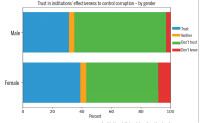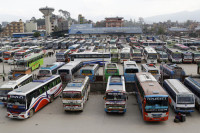National
Experts warn of security risk as Chinese firm is chosen to equip PM’s Office
The government’s decision to task a Chinese firm with building an “action room” at the Prime Minister’s Office could pose huge national security risks, experts have warned.
Anil Giri
The government’s decision to task a Chinese firm with building an “action room” at the Prime Minister’s Office could pose huge national security risks, experts have warned.
The PMO awarded a contract last week to the Huawei Technologies Co Ltd after suspending a competitive bidding process to set up the “action room” equipped with video conferencing and conference call, among others, where the prime minister and senior officials can directly monitor large projects for their progress.
The PM’s Office is considered a “super sensitive zone” in terms of national security. Awarding the contract related to information and technology to the company that originated in a country with direct security and strategic interests in Nepal will risk Nepal’s national security, experts argue.
In the past, successive governments have rejected Indian proposals to modernise immigration facilities at the Tribhuvan International Airport, and printing of the passport. A Chinese proposal to set up a security printing press was also rejected due to concerns over national security. There is also an ongoing debate at the Home Ministry over whether to accept the US assistance of immigration-related software to keep records of tourists entering Nepal from various checkpoints.
Security experts say India, China, the United States and Pakistan have direct security and strategic interests in Nepal, asking the government to be careful while awarding contacts to the firms based in these countries as that could pose security threats through leakage of sensitive information and breach of data stored in government platforms.
While national institutions are capable of building and operating such firms, the PMO suspended a tender called by the National Information Technology Centre (NITC) and awarded the contract to the Chinese firm after bilateral negotiations. The project cost is around Rs54.2 million.
Since the PMO is a “super sensitive zone” in terms of national security, said security expert Geja Sharma Wagle, there should be no compromise on Nepal’s security interests by allowing foreign firms to work inside the PMO.
“Firms having origin in countries that have direct security and strategic interests in Nepal should not be allowed to work in sensitive zones. That would have serious national security implications,” said Wagle.
If national institutions are capable of setting up such facilities, a foreign firm should not be commissioned to do that, he added.
The NITC had called a local tender to construct the action room. It was suspended after pressure from Prime Minister KP Sharma Oli’s aides.
PMO Spokesperson Binod Bahadur Kunwar confirmed that a subsidiary company of the Chinese Huawei is contracted to construct the facility but he refused to comment on its implications.
“It’s a technical matter. After evaluating the technical and financial proposals of the two firms interested, we have selected the Huawei,” he told the Post.
Huawei is a Chinese multinational telecommunications equipment and consumer electronics manufacturer that works with telecom service operators in Nepal.
“We don’t know why a public tender was called, why it was suspended later and why the contract was awarded after bilateral negotiations,” said a senior official at the PMO, adding that several Nepali firms are qualified to build such facilities.
A senior NITC official said several Nepali firms can construct such facilities. Kunwar, the PMO spokesperson, contested the claim saying that Nepali firms were not fit technically for constructing such a high-tech facility.
Initially called “war room”, the “action room” will have video conferencing links with major infrastructure projects.
“National institutions like the PMO, the Home Ministry, the Defence Ministry, Foreign Ministry, police and the Army should avoid such installations due to security sensitivity,” said retired Nepal Army Gen Binoj Basnyat.
“We should install or adopt a home-grown system. Who will responsible if our information is leaked?”




 13.89°C Kathmandu
13.89°C Kathmandu














